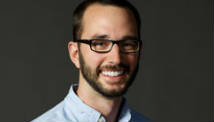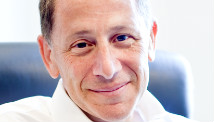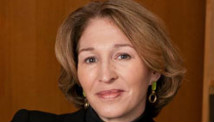STORY HIGHLIGHTS
- NEW: Radio traffic describes use of gas canisters at cabins
- Slain officer's widow thanks mourners: "A lot of people loved Mike"
- Villaraigosa says police have a "reasonable belief" that Dorner died in a mountain standoff
- Authorities have not conclusively identified the body found near Big Bear Lake
Follow the story here and at CNN affiliates KCBS/KCAL, KABC and KTLA. Anderson Cooper 360º devotes the entire hour to the frenzied manhunt, the final shootout, and the people allegedly killed by an ex-LA cop. Watch "9 Days of Terror: The Hunt for Christopher Dorner" Wednesday at 8 p.m. ET on CNN.
Riverside, California (CNN) -- A "sigh of relief." A widow's restrained sobs. The lingering fear of the targets, waiting to hear whether their pursuer had truly been run to ground.
A day after a man suspected to be renegade ex-cop Christopher Dorner died in a blazing mountain cabin, police from around the Los Angeles area and beyond gathered to bury one of their own Wednesday. A squad of bagpipers led Michael Crain's flag-draped casket through a cordon of blue uniforms into a church in Riverside, the Los Angeles suburb where he served 11 years on the force.
The mourners who packed the church included California Gov. Jerry Brown, his Highway Patrol chief and law enforcement from an alphabet soup of agencies around the region.
"I knew that communities would reach out, and I knew a lot of people loved Mike," Regina Crain, the slain officer's widow, told them as she choked back tears. "And I knew that I would have support no matter what. But I really did not realize the sheer scale of this, and how many people are touched by his life. It gives me really great comfort to see that, and I want to thank you all."
Investigators say Crain was shot and killed by Dorner, a fired Los Angeles cop who launched a vendetta against his old department last week. They blame the 33-year-old former Navy officer for the deaths of Crain and a still-unnamed San Bernardino County sheriff's deputy killed in Tuesday's fiery standoff. He is also accused of killing the daughter of a former LAPD captain and her fiance and of shooting three other cops, including Crain's partner. The violence spree began February 3.
Los Angeles Mayor Antonio Villaraigosa said authorities have a "reasonable belief" that the body found in a burned-out cabin in the San Bernardino Mountains late Tuesday is Dorner's. But while the SWAT teams that prowled the city in search of the former Navy officer have stood down, the officers detailed to guard his potential victims remain in place.
"I think we all are breathing a sigh of relief," Villaraigosa said Wednesday. "We do believe that it is the body of Christopher Dorner, but we don't know for a certainty. And until we do, those police officers who were targeted will continue to be protected. That's the least we could do."
'A very trying time' for the LAPD
Authorities say Dorner launched a guerrilla war against the Los Angeles Police Department over what he considered his unfair dismissal in 2009.
It wasn't clear when a formal identification could be made of the charred remains found in the cabin near Big Bear Lake, about 100 miles east of Los Angeles, after a Tuesday shootout with police. Until then, "a lot of apprehension" remains in the ranks of the LAPD, Lt. Andy Neiman said.
"It's been a very trying time over the last couple of weeks for all of those involved and all those families, friends and everybody that has been touched by this incident," he said.
Timeline in manhunt
Meanwhile, questions swirled Wednesday over how the shootout, standoff and fire that led to Dorner's presumed death unfolded.
Investigators began scouring the mountains on Thursday, when investigators found Dorner's scorched pickup. Police, sheriff's deputies and federal agents swarmed into the area, working through a weekend blizzard, but the trail was cold for days.
On Sunday, the San Bernardino County Sheriff's Department said it had scaled back the search. Villaraigosa announced a $1 million reward for information leading to Dorner's arrest and conviction, spurring hundreds of tips.
Then early Tuesday afternoon, California Fish and Wildlife wardens said they spotted Dorner driving a purple Nissan down icy roads near Big Bear Lake. He was driving very close to some school buses, as if using them as cover, said Lt. Patrick Foy. No children were on the buses, Foy said.
'Here comes this guy with a big gun'
The wardens, driving in two different vehicles, chased Dorner, and a gun battle ensued. One of the warden's cars was hit, and Dorner crashed his car and ran, according to authorities. He then carjacked a pickup truck.
Rick Heltebrake, a camp ranger, said he was driving when he saw the crashed purple vehicle -- and then something terrifying.
How authorities identify a burned body
"Here comes this guy with a big gun, and I knew who it was right away," Heltebrake told CNN affiliate KTLA. "He just came out of the snow at me with his gun at my head. He said, 'I don't want to hurt you. Just get out of the car and start walking.' "
Heltebrake said the man let him take his dog and walk away with his hands up.
"Not more than 10 seconds later, I heard a loud round of gunfire," Heltebrake said. "Ten to 20 rounds, maybe. I found out later what that was all about."
Dorner fled to a nearby cabin and got into another shootout, this time with San Bernardino County deputies. He killed one and wounded another, San Bernardino County Sheriff John McMahon told reporters Tuesday evening.
The wounded deputy was in surgery at that time but "should be fine," McMahon said.
Some of the firefight between police and the suspect was captured live on the telephone of a reporter for CNN affiliates KCBS and KCAL. Police in Los Angeles listened live over police scanners broadcast on the Internet, Neiman said.
"It was horrifying to listen to that firefight," he said. "To hear those words, 'officer down,' is the most gut-wrenching experience you can have as a police officer, because you know what that means."
'Maintain your discipline'
A law enforcement source told CNN the cabin caught fire when police tossed smoke devices inside. The cabin was fully ablaze within minutes and burned for hours as authorities waited at a distance.
Devices such as "flash-bang" grenades and tear gas canisters designed to disorient and disable suspects can cause fires, CNN contributor Tom Fuentes, a former FBI assistant director, said Wednesday. But it wasn't clear exactly how the fire started.
Audio from a Los Angeles television station captured the sound of someone early in the standoff shouting, "Burn it down ... burn that goddamn house down. Burn it down." It's not clear who used those words.
But the order to use smoke canisters -- "burners" -- didn't come for another two hours, according to San Bernardino County sheriff's radio traffic.
"Seven burners deployed, and we have a fire," one officer reported at 4:16 p.m. (7:16 p.m. ET).
Five minutes later, a single gunshot was reported from inside the house. A senior officer ordered units around the cabin, "Stand by. Maintain your discipline." About a minute after that, officers reported ammunition exploding inside.
After initially saying that no body had been found, sheriff's investigators finally confirmed overnight that they had found charred human remains in the ashes.
Dorner cheered in some quarters
Dorner had vowed to kill police officers to avenge what he called an unfair termination. He was fired after accusing his training officer of kicking a suspect during a July 2007 arrest -- a complaint the LAPD determined was unfounded.
Talk Back: Does the Dorner case teach us anything about guns?
The department accused him of lying to superiors and to internal affairs investigators and forced him out in January 2009. Dorner challenged his dismissal in court but was unsuccessful.
Dorner was first named a suspect in two shooting deaths on February 3: Monica Quan, the daughter of his police union representative, and her fiance, Keith Lawrence.
Police say he killed Crain and wounded Crain's partner in an ambush on their patrol car Thursday. They say he also wounded an LAPD officer who chased him in the suburban city of Corona, California.
In a manifesto explaining the reasons behind his rampage, Dorner said nothing had changed in the LAPD since its scandals of the 1990s, the Rodney King beating and the Rampart police corruption case. Those allegations have struck a chord with some who say that despite being named as a suspect in four killings, Dorner was seeking justice.
Shadowed by that history, LAPD Chief Charlie Beck announced Saturday that the department would re-examine its proceedings against Dorner. The review is "not to appease a murderer," but "to reassure the public that their police department is transparent and fair in all things we do," he said.
During the manhunt, LAPD officers guarding one of the people named in Dorner's manifesto opened fire on a truck in the Los Angeles suburb of Torrance last Thursday, wounding two women inside. In a television interview over the weekend, Beck called that a "tragic, horrific incident."
CNN's Miguel Marquez, Paul Vercammen, Stan Wilson, Casey Wian, Kathleen Johnston, Alan Duke, Lateef Mungin, Chelsea J. Carter, Michael Martinez, Holly Yan and Michael Pearson contributed to this report.



















